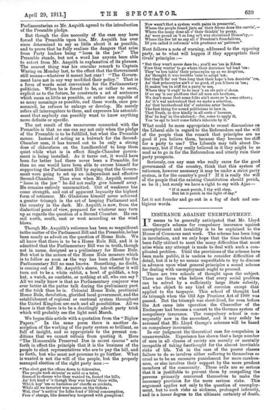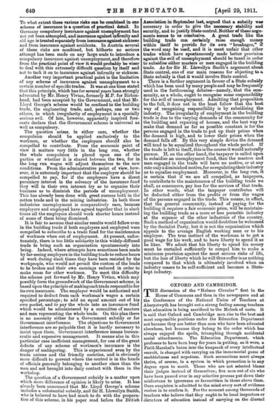INSURANCE AGAINST UNEMPLOYMENT.
IT seems to be generally anticipated that Mr. Lloyd. George's scheme for compulsory insurance against unemployment and invalidity is to be explained to the House of Commons next week. The scheme has been long in incubation, and we only hope that the time taken has been fully utilised to meet the many difficulties that must arise when any attempt is made to deal with such a com- plicated problem. Until the provisions of the scheme have been made public, it is useless to consider difficulties of detail, but it is by no means unprofitable to try to discuss in advance upon what general principles a sound scheme for dealing with unemployment ought to proceed. There are two schools of thought upon the subject. There are those who believe that every social problem can be solved by a sufficiently large State subsidy, and who object to any kind of coercion except that applied to the taxpayer. This school of thought had its triumph when the Old Age Pensions Act of 1908 was passed. But the triumph was short-lived, for even before the Act came into operation: the Chancellor of the Exchequer had become a convert to the German system of compulsory insurance. The compulsory school is con- sequently now in the ascendant, and it may safely be assumed that Mr. Lloyd George's schemes will be based on compulsory insurance. In our judgment the theoretical case for compulsion is unanswerable. Experience has shown that a large number of men in all classes of society are morally or mentally incapable of taking forethought for the almost inevitable risks of life. Yet in the case of the poorer classes failure to do so involves either suffering to themselves so cruel as to be an excessive punishment for mere careless- ness, or else involves their support by the more prudent members of the community. These evils are so serious that it is justifiable to prevent them by compelling the persons primarily concerned themselves to make the necessary provision for the more serious risks. This argument applies not only to the question of unemploy- ment, but to such risks as sickness, prolonged infirmity, and in a lesser degree to the ultimate certainty of death. To what extent these various risks can be combined in one scheme of insurance is a question of practical detail. In Germany compulsory insurance against =imp/. ent has not yet been attempted, and insurance against 11111 I ty and old age is treated separately from insurance against sickness and from insurance against accidents. In Austria several of these risks are combined, but hitherto no serious attempt has been made on any large scale to introduce a compulsory insurance against unemployment, and therefore from the practical point of view it would probably be wiser to deal with this extremely difficult question by itself and not to tack it on to insurance against infirmity or sickness.
Another very important practical point is the limitation of any scheme of insurance against unemployment to a certain number of specific trades. It was at one time stated that this principle, which has for several years been strongly advocated by Mr. Henry Vivian, formerly M.P. for Birken- head, had been accepted by the Government, and that Mr. Lloyd George's scheme would be confined to the building trade, the engineering trade, and, perhaps, one or two others, in which irregularity of employment is a specially serious evil. Of late, however, apparently inspired fore- casts declare that the Government scheme is universal as well as compulsory. The question arises, in either case, whether the compulsion should be applied exclusively to the workmen, or whether the employers should also be compelled to contribute. From the economic point of view it matters very little in the long run, whether the whole compulsion is placed upon one of the parties or whether it is shared between the two, for in the long run wages will adjust themselves to the new conditions. From the administrative point of view, how- ever, it is extremely important that the employer should be compelled to pay, for if the employers have a direct pecuniary interest in the solvency of the insurance fund they will in their own interest try so to organise their business as to diminish the periods of unemployment. This has already been done with great success both in the cotton trade and in the mining industries. In both these industries unemployment is comparatively rare, because employers and employed have agreed together that in slack times all the employees should work shorter hours instead of some of them being dismissed.
It is fair to assume that similar results would follow even in the building trade if both employers and employed were compelled to subscribe to a trade fund for the maintenance of workmen when out of employment. At present, unfor- tunately, there is too little solidarity in this widely-diffused trade to bring such an organisation spontaneously into being. Indeed, where attempts have sometimes been made by far-seeing employers in the building trade to reduce hours of work during slack times they have been resisted by the workpeople, who would not permit the custom of the trade to be broken and their own earnings reduced in order to make room for other workmen. To meet this difficulty the scheme put forward by Mr. Henry Vivian, which may possibly form the groundwork of the Government scheme, is based upon the principle of making each trade responsible for its own insurance. The employer would be authorised and required to deduct from each workman's wages a certain specified percentage ; to add an equal amount out of his own pocket, and to pay the whole into an insurance fund which would be administered by a committee of masters and men representing the whole trade. On this plan there is no necessity either for a Government subsidy or for Government interference. The objections to Government interference are so palpable that it is hardly necessary to insist upon them. Government interference means bureau- cratic and expensive management. It means also in this particular case inefficient management, for one of the great defects of any scheme of workmen's insurance is the danger of malingering. This is experienced even by the trade unions and the friendly societies, and is obviously more difficult to prevent where the control is in the hands of officials generally belonging to another class than the men and not brought into daily contact with them in the workshop. The question of a Government subsidy is a matter upon which more difference of opinion is likely to arise. It has already been announced that Mr. Lloyd George's scheme includes a substantial subsidy, and Sir H. Llewellyn Smith, who is believed to have had much to do with the prepara- tion of this scheme, in his paper read before the British Association in September last, argued that a subsidy was necessary in order to give the necessary stability and security, and to justify State control. Neither of these argu- ments seems to us conclusive. A great trade like the building trade can certainly raise enough money within itself to provide for its own "breakages," if the word may be used, and it is most unfair that other trades which have spontaneously made better provision against the evil of unemployment should be taxed in order to subsidise either masters or men engaged in the building trade. As for Sir H. Llewellyn Smith's argument about State control, one of our main reasons for objecting to a State subsidy is that it would involve State control. There is a further argument in favour of a State subsidy which has been used by many people and may be frequently used in the forthcoming debates—namely, that the com- munity, as a, whole, ought to recognise some responsibility for the evil of unemployment. Admitting that proposition to the full, it does not in the least follow that the best way of recognising responsibility is by subsidising the industry. The irregularity of employment in the building trade is due to the varying demands of the community for the building and repairing of houses, and the best way to make that demand as far as possible constant is for the persons engaged in the trade to put up their prices when the demand is high, and to lower their prices when the demand falls off. By this very simple device the demand will tend to be equalised throughout the whole period. If the trade is left to itself, this is the course it would naturally pursue. If, on the other hand, the taxpayer is called upon to subsidise an unemployment fund, then the masters and men engaged in the trade will have no motive, or at any rate only a diminished motive, for so regulating their industry as to equalise employment. Moreover, in the long run, it is certain that if we are all compelled, as taxpayers, to contribute to the maintenance of the building trade we shall, as consumers, pay less for the services of that trade. In other words, what the taxpayer contributes will be deducted either from the profits or from the wages of the persons engaged in the trade. This means, in effect, that the general community, instead of paying for the building it requires a fair economic price, will be maintain- ing the building trade as a more or less parasitic industry at the expense of the other industries of the country. Such a method of organisation would doubtless be welcomed by the Socialist Party, but it is not the organisation which appeals to the average English working man or to his employer. The true instinct of the workman is to get a good wage for his work, and to have liberty to spend it as he likes. We admit that his liberty to spend his money must be curtailed sufficiently to compel him to make a minimum provision against the most serious risks of life, but the loss of liberty which he will thus suffer is as nothing compared to that which is ultimately involved when an industry ceases to be self-sufficient and becomes a State- kept industry.



























































 Previous page
Previous page